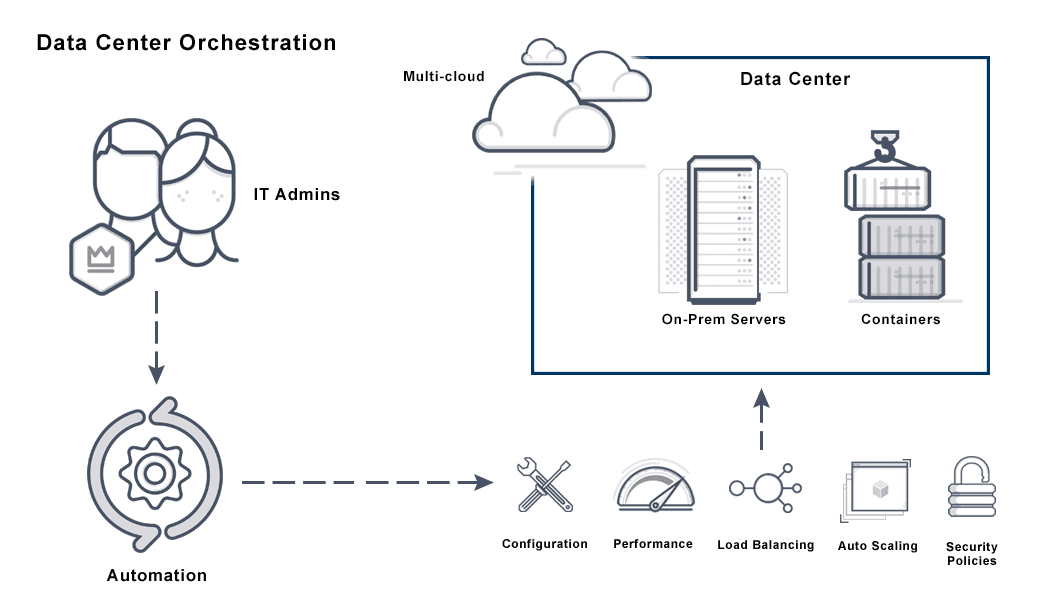Data Center Orchestration Definition
Data center orchestration is a process-driven workflow that helps make data centers more efficient. Repetitive, slow and error-prone manual tasks are replaced by the automation of tasks and the orchestration of processes.

What is Data Center Orchestration?
Data center orchestration software uses the automation of tasks to implement processes, such as deploying new servers. Automation solutions which orchestrate data center operations enable an agile DevOps approach for continual improvements to applications running in the data center.
Consider instruments or singers in a band. Each has an independent sound, just as software defined applications have their own task. But when they work well together, a unique sound is produced. Orchestration outlines how individual tasks can come together for a larger purpose. It organizes all the tasks of various services and creates a highly functioning and responsive data center.
The massive amount of data move to cloud computing has put more pressure on the data center. Data center needs to be a central management platform and be able to provide the same agility as public clouds. Data center automation and orchestration creates the efficiencies needed to meet that demand.
What is the Function of Data Center Orchestration Systems?
Data center orchestration systems automate the configuration of L2-L7 network services, compute and storage for physical, virtual and hybrid networks. New applications can be quickly deployed.
Benefits of data center orchestration systems include:
- Streamlined provisioning of private and public cloud resources.
- Less time to value between a business need and when the infrastructure can meet the need.
- Less time for IT department to deliver a domain specific environment.
Data center orchestration systems are a framework for managing data exchanged between a business process and application. They use the following functions:
-
- Scheduling and coordination of data services.
- Leveraging of distributed data repository for large data sets.
- Tracking and publishing APIs for automatic updates of metadata management.
- Updating policy enforcement and providing alerts for corrupted data.
- Integrating data services with cloud services.
Data Center Orchestration Tools
The following are popular data center orchestration and automation tools for the data center and cloud environments:
-
-
- Ansible — An agentless configuration management tool. Created to push changes and re-configure newly deployed machines. Has an ecosystem conducive for writing custom apps. The platform is written in Python and allows users to script commands in YAML.
- Chef — Uses a client-server architecture and is based on Ruby. Presents the infrastructure as a code.
- Docker — Features isolated containers, which allows the execution of many applications on one server.
- Puppet — Built with Ruby and uses an agent/primary architecture. Created to automate tasks for system administrators.
- Vagrant — Helps build, configure and manage lightweight virtual machine environments. Lets every member of the IT team have identical development environments.
-
Does VMware NSX Advanced Load Balancer offer Data Center Orchestration?
Yes. The VMware NSX Advanced Load Balancer provides centrally orchestrated microservices composed of a fabric of proxy services with dynamic load balancing, service discovery, security, micro-segmentation, and analytics for container-based applications running in OpenShift and Kubernetes environments. The VMware NSX Advanced Load Balancer delivers scalable, enterprise-class microservices and containers to deploy and manage business-critical workloads in production environments using Redhat container orchestration with OpenShift and Kubernetes clusters.
For more on the actual implementation of load balancing, security applications and web application firewalls check out our Application Delivery How-To Videos.
For more information on data center orchestration see the following resources: